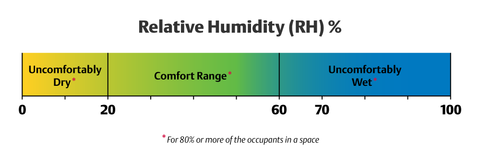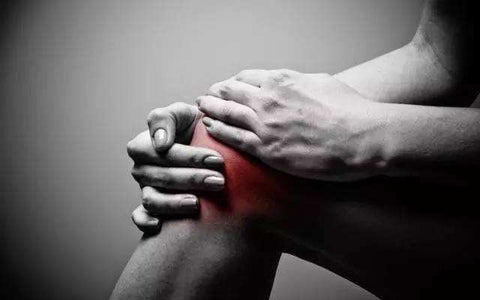Most of us thoroughly enjoy the rain, especially those who live closer to the equator or in the Middle East. Rain is scarce and therefore feels no less than a blessing, and occasionally a miracle for them. What comes after rain is not something that is appreciated or enjoyed, I think we can all agree on that. What we are referring to is humidity and moisture in the air, after rain or drizzle. Humidity refers to the amount of water vapor in the air. Neither too low, nor too high humidity is good for your body, or environment as they can cause different types of health and other problems for each circumstance.
What happens is that when clouds hold a lot more water vapor than their capacity, the humidity reaches 100% and the clouds ultimately start to drip and this is when it starts raining. When it rains, the relative humidity will increase as evaporation takes place. Evaporation cools the air and increases the absolute moisture content of the air. The longer the rain, the more humid the environment will be afterwards. The hotter the air, the more humidity there will be and the cooler the air, the less the humidity.
Negative effects of humidity and moisture
High Humidity and Moisture
- Frizzy hair
It is one of the outcomes of high humidity levels. Your hair ends up absorbing too much moisture resulting in bad hair days for as long as it stays. They end up curled and frizzy. But worry not as many hair brands have come out with hair products such as shampoos and conditioners to control the frizz.
- Sweating
We tend to sweat more when the air is more humid because humidity makes the air hotter than it is and how does your body react to hot temperature? It sweats. The hotter the air, the more you’ll sweat which ends up dehydrating your body and the only way to quench that type of thirst is by drinking a gallon of water. What humidity also does is that it disturbs the evaporation process from your skin so you end up feeling even warmer and sweat more.
- Overheating
Humidity does not directly affect the temperature. It just tricks your brain into believing the that it’s hotter than it actually is. The intensity of heat can also result in headaches or a heat stroke. It is advised that one should refrain from outdoor activities when the temperature and humidity levels are too high as the heat stroke may even lead to death.
Another legit reason that the body overheats is because it is consuming so much resources trying to sweat, to keep the insides cool, that it inevitably ends up heating the outer skin of the body. The sweat that is released from the body gets hotter and hotter still, until the body overheats and ultimately suffers from a heat stroke.
- Damage to interiors & walls
Increased levels of moisture can damage your furniture because fungi grow on it and starts consuming it which leads to decay. Eventually you will realize that your wooden or leather sofas may not be able to stand still anymore without falling apart.
Moisture can also damage the paint of the walls and other important components of a building. Because most paint isn’t water resistant, having more than 50% moisture in the room can cause the room’s paint to corrode away and look unattractive.
- Pests and Bugs
Some insects and microorganisms thoroughly enjoy the moisture provided by the humid and warm climate. Humidity offers breeding ground to such insects which end up destroying your sleep and furniture. Bacteria, molds, and mites are some of the examples. Therefore, it’s best to keep humidity levels constant and stable.
According to experts, ideal humidity is considered to be around 40%-60%. Although, it most does depend on the weather. It is said that approximately 50% diseases are caused by the unhygienic environment inside our homes. However, a dehumidifier can solve all these problems and come to the rescue. It decreases moisture levels in the air making it cooler and comfortable to breathe. A whole home dehumidifier is connected to your HVAC and as soon as it detects high or low humidity levels, it turns on and adjusts the levels accordingly. A dehumidifier clears out all the moisture and does not leave any chance for the growth of harmful microorganisms such as molds.

Other health issues caused by humidity and moisture
Allergies become active when humidity levels drop as your nasal passage dries out. It can also result in nose bleeds and sinus infection. Asthma is usually the outcome of high humidity levels because when the air gets filled with water vapor and moisture, it gets difficult to breathe and those who suffer from asthma have a higher chance of having an asthma attack under such circumstances.
Excessive moisture can cause knee joint pain in middle-aged and elderly people.

Why you should get a dehumidifier
Dehumidifiers help decrease the level of humidity in the environment, and ultimately make the area a much better place to live in. Dehumidifiers are getting more and more cheaper by the day, and you can easily install a dehumidifier after buying it, all on your own. The process is very simple, just like turning on a fan or a light bulb.
Dehumidifiers also come in varying sizes, depending on the type of area you’re trying to use them all in, and there is no limit to how big the building is. The desiccant dehumidifiers are really good for bigger rooms, as compared to generic refrigerant dehumidifiers, but the best is still whole home dehumidifier, that covers the whole building without having to rely on multiple machines. It is usually installed in exhausts or ventilation areas, and is very power efficient.
Investing in a dehumidifier is a really good idea nonetheless.
Conclusion
If you live in a humid environment, you should definitely invest in dehumidifiers. They will prove to be an a rather loyal and useful ally for you against your battle with the hot and wet atmosphere.

